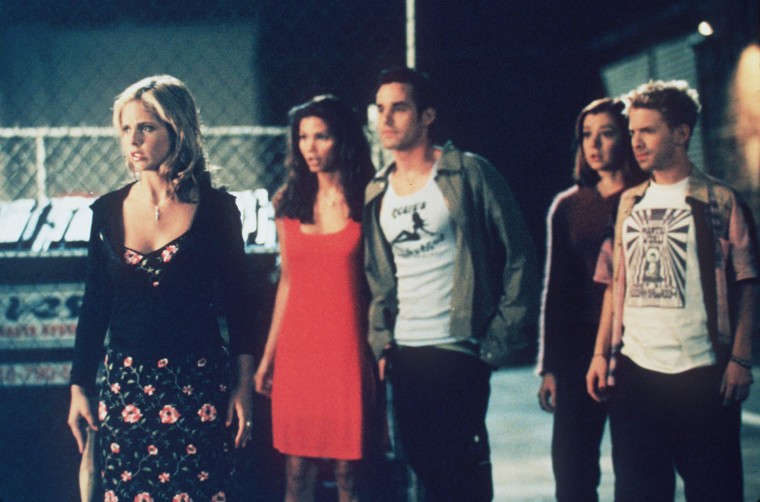On Wednesday, “Buffy the Vampire Slayer” and “Angel” actor Charisma Carpenter posted a lengthy statement to her social media accusing writer/director Joss Whedon of creating an abusive and cruel work environment. Carpenter’s statement also declared her support of “Justice League” actor Ray Fisher, who triggered an investigation by WarnerMedia after he accused Whedon of behaving abusively on that set.
Carpenter’s accounts of Whedon’s “harassment” and “serialized abuses of power” include him accusing her of “sabotaging” “Angel” by getting pregnant and “calling [her] ‘fat’ to colleagues.” For Whedon, perhaps, it all ended with him “unceremoniously" firing Carpenter from the series after she gave birth, but the actor couldn’t move on that easily.
“The disturbing incidents triggered a chronic physical condition from which I still suffer,” Carpenter wrote.
Want more articles like this? Follow THINK on Instagram to get updates on the week's most important cultural analysis
Then the floodgates opened. Several of Carpenter’s former co-stars (all women, notably) were quick to show their support. “I don’t want to be forever associated with the name Joss Whedon,” Sarah Michelle Gellar (Buffy herself) said. Amber Benson (who played Tara) quote-tweeted Carpenter, noting that “Buffy was a toxic environment and it starts at the top.” And Michelle Trachtenberg, who played Buffy’s little sister, Dawn, shared Gellar’s post, adding that she found Whedon’s work behavior “not appropriate,” especially as she was a teen at the time.
Whedon has yet to respond to the claims.
Then the floodgates opened. Several of Carpenter’s former co-stars (all women, notably) were quick to show their support.
But like so often happens with alleged abuse, neither this wave of experiences nor Fisher’s statements are terribly surprising. Whedon’s work has been hugely popular and influential, but Whedon the man has been accused before of bullying and a seeming indifference to the feminist themes he loves to write about. In a 2017 essay published by The Wrap, Whedon’s ex-wife, Kai Cole, made detailed claims that Whedon had cheated on her and gaslighted her throughout their 20-year relationship, saying that he could not fathom the “hypocrisy of being out in the world preaching feminist ideals” and used their relationship “as a shield” against any criticism of his social politics.
Situations like these involve fans in a few ways. We develop relationships, no matter how one-sided, with the people and stories we watch on screen. It can really be heartbreaking to find out that a piece of art that you love was created in an unsafe, unkind environment and that individuals you admire were terrorized in the process. Because of that connection, “Buffy” and “Angel” fans have been commenting in droves on the posts of the women who’ve spoken out, offering their condolences and thanking them for their strength.
In this case, many who love the show are experiencing a special kind of betrayal. “Buffy” is a series beloved by fans in part because of its stereotype-busting female characters. It provided pop culture with some of its most visible, well-rounded depictions of teenage girls, who are rarely taken seriously or given much agency on screen.
And then there’s deciding how to move forward with the art itself. In light of these accusations, we can safely say that Joss Whedon is not in fact a feminist, or at least not one who understands what the word actually means. That doesn’t mean that “Buffy” isn’t a feminist show. And the reverse is also true: Whedon can’t be called a feminist — or assumed to be a feminist — simply because he was the driving force behind “Buffy.”
The implosion of a former genre darling like Whedon is yet more proof that we can’t judge men in these positions of power by their output alone.
The implosion of a former genre darling like Whedon (HBO “parted ways” with the showrunner on the upcoming series, “The Nevers” during the WarnerMedia investigation) is yet more proof that we can’t judge men in these positions of power by their output alone. After all, Whedon didn’t create “Buffy” alone — he had help, and lots of it, from collaborators of different genders who all had a hand in the final product. As Cole hinted in her essay, he may have been so good at convincing himself that he was pro-women that he was occasionally able to succeed in putting something empowering and true on screen. And he benefited from aping feminism in his work, in the form of money, power, opportunities and influence.
If you look closely, you see the cracks, however. In “Buffy,” it’s a character like Xander (Nicolas Brendon) who, especially in the early seasons, behaves like the jilted “nice guy” who isn’t getting the sexual gratification he deserves just for existing. It’s the premise of Whedon’s short-lived series “Dollhouse,” which is about a legion of human “Dolls” who are rented out to clients for any purpose and have their memories wiped clean each time. It’s the beloved web series musical “Dr. Horrible’s Singalong Blog,” which ends with the lovable, dorky protagonist accidentally killing the woman he has a crush on and becoming powerful because of it. It’s the widely criticized storyline Whedon gave the character Natasha Romanov (Scarlett Johansson) in “Avengers: Age of Ultron,” saddling the superhero with a forced love story and equating infertility with a loss of humanity.
Knowing what they know now, some fans may not be able to revisit Whedon’s work with the same joy or satisfaction. Others may be able to carry on, celebrating what his shows and movies mean to them and appreciating the contributions of all the other artists involved. Ultimately, it’s a personal decision. His defenders will ask us to simply ignore the contradiction we now know lies at the heart of “Buffy.” But the show is not a reflection of who Whedon is. And his co-workers are speaking louder than his characters ever could.
Related:


